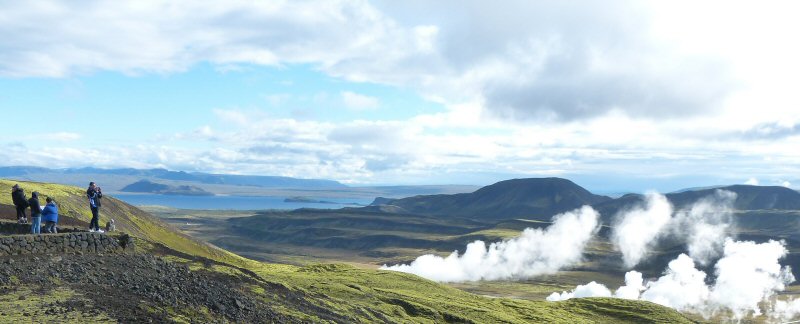I like to think that I am online savvy, so when my wife suggested we have a short break in Iceland, my first thought was to get on the web and book everything we needed. This would be flights, transfers, accommodation and excursions. We didn’t have much time, so we thought we would take a two night break. We would have time for a Golden Circle tour and a visit to the Blue Lagoon. Not exactly exploring Iceland in depth but, for us, it would be a great break and the chance to get a taste of the amazing Icelandic topography.
Clearly, a package deal would be perfect for us. We would arrive Day 1, Golden Circle tour Day 2, Blue Lagoon and back to the airport Day 3. After my first hour or so online, all I could uncover were three night breaks that could accommodate our two excursion requirements. I decided that I would self-package. Skyscanner showed that Icelandair had the best flight options, booking.com showed us some hotels but they looked expensive and I really didn’t know the best location to choose. Excursions looked bookable but on Day 3 we were quite constrained on time, needing to get back to the airport. After another hour online, I just gave up in frustration. I was busy and really didn’t have time for this.
My wife had an interesting idea. She called a travel agent. She explained what we wanted to do. This took all of ten minutes. Over the course of the next few days, there were a few more phone calls to discuss options. The travel agent booked the trip. A printed itinerary, e-ticket receipts and vouchers for the hotel, transfers and excursions arrived in the post. This had maybe taken 30 minutes of my wife’s time.
This experience comes to mind as I have just organised Travel Technology Initiative’s next conference – Digital Travel – State of Play -scheduled for 20 September. One of my speakers is Rob Wortham. Rob is one of the founders of RWA Ltd, a leisure travel technology provider, but stepped back from this role to pursue a PhD around the subject of Artificial Intelligence (AI). I have watched a couple of movies in the last year that involve AI – Her and Ex-Machina – and Rob will be talking at the conference about AI interacting with humans. (In both of those films, the interaction with humans went awry.)
Now there is no way that AI is anywhere near as developed as it is depicted in science fiction movies but this has got me thinking about whether it could ever replace the travel agent? If we look at my recent experience with my Icelandic break, why was my travel agent able to put together the itinerary we wanted when I just found it too time-consuming? Of course, she might have put an equal amount of time as me into sorting this booking out but I doubt it. She had the experience and knowledge to go to the right people that were needed to pull all the elements of the trip together. She knew to get in touch with GrayLine Iceland for all the ground elements of the trip and I just had not found them on the Web.
So if it was my agent’s experience and knowledge that helped her, but aren’t these the very same attributes that are embodied by AI?
20+ years ago, at the start of the Internet era, I and many others said that we would no longer need travel agents in 25 years’ time. I am now thinking that travel agents are indispensable, but could artificial intelligence computing replace them one day? What do you think?



Interesting article, the answer in short is yes especially a hybrid solution. Low value, commoditised transactions assisted by machine learning techniques and an overflow to humans for more complexity will have a place in the future. The pressure for profitability in a low margin volume business makes this an area that travel companies cannot ignore and must shine a light on. The opportunities for AI are as great as those afforded by the arrival of the internet itself and the levels of sophistication and accuracy will only increase in my humble opinion.